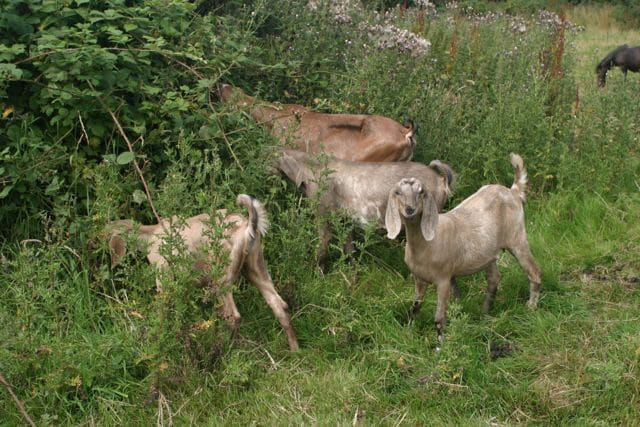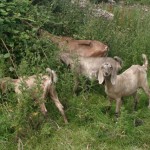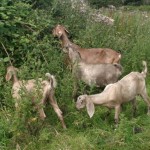Pet Advice Guides for Pet Owners, Sanctuary Life
Natural food for goats
This is goat heaven! Goats love scrubland and are never happier than when they have a patch of thistles, nettles and brambles to browse on. Although they only have one set of teeth, on the bottom jaw, and a soft palate on their top jaw, they can crunch up the thorniest plant without any difficulty. Domestic goats appreciate a small feed of concentrates and you can buy in ready made goat mix. We make our own, it’s mainly oats with a small proportion of bran, some linseed flakes and flaked maize mixed together and give a handful or two twice a day. We supplement this in winter with cod liver oil and seaweed power and follow the recommended dosage. Milkers or pregnant lady goats have a bit more and we always feed each goat as an individual and by condition. No two goats are alike, some need more than others.
It’s strange but if you have a thin goat or one in poor condition, the best way to fatter her up is to give her lots of scrub leaves to eat. Or branches will suit her as well, goats are death to trees so unless you want a copse clearing, you’d best fetch the leafy stuff in for her. Goats get in the best condition when they are out grazing, nothing can beat fresh air, natural food and freedom. They do run for cover if the weather turns wet though.
All goats need shelter overnight, they won’t stay out in the fields like cows and horses. A warm comfy bed with some nice straw is what they like. If it’s been raining and the grass is wet in the morning, you need to either keep them in until everything dries out or let them have lots of hay first. A goat with a tummy full of wet grass is likely to become bloated and ill. Wild goats have plenty of woody, stalky plants to eat and have learned to be selective about food. The grass available to most wild goats is unlikely to be lush and it’s this that harms them.
Feeding a goat in poor condition a lot of grain will not usually make her put weight on. It’s good hay and leaves and branches that will get her right. A supplementary grain ration is fine if she’s eating plenty of natural food first.
If goats have access to good grazing then they will do well – by ‘good’ grazing I mean the type that is suited to them and which most other domestic grazing animals would spurn. Cows like long, lush grass, horses have more of a ‘bite’ when they eat and although they will tackle rough grass if they are hungry enough, their preference is for short, sweet grazing. Sheep are a similar to goats and will clear some of the weeds but don’t have the same preference for thick, stalky and woody stems. Goats improve scrubland and clear the way for wildflowers – we’ve had fields with dense thistle and scrub change into flower scented meadows after the goats have grazed them.
If you don’t have any scrub to let the goats out on to, then you will have to supplement their diet with hay. What is ‘good’ hay for cows and horses will be useless for goats. The soft, sweet smelling meadow hay, full of dried nettles and flowers, is what your goats need. Clover hay is also excellent, if you can get it. Because it is stalky, it is more difficult to make successfully, you need a good period of fine sunny weather to get it dry before it’s baled.
This goat is Claudia who has three kids, two girls and a boy. Goats are very maternal animals and Claudia adores her little family. She is protective of them and makes a terrific fuss if they go out of sight.
If you only have one or two goats, why not make your own hay? Get yourself a scythe and as you swing away at the nettles and long grass, you’ll keep fit as well. You have to turn the hay with a pitchfork as often as you can. As the sun dries one side, turn it over and move it in to rows. When you are confident it is dry and nice and crackly, you can pull it together into heaps. It just makes it easier to bag up or put on a small cart. Hay always used to be stored loose in a barn, you can store it in a shed though. The trick is to get the hay when it’s still green and full of life but dry enough to store without going mouldy. A drop of rain on it or any residual moisture in the stems and it will be ruined. Haymaking is an art and if you get it right your goats will love it.
Even if you buy your hay in, ready done in bales, it’s worth making a bit of nettle hay just in case you have a poorly goat who needs a bit of coddling. Nettle hay is a real treat and full of the vitamins and minerals that are so essential for goats. Many years ago I was told by a vet that a deer has four times the mineral requirement of a cow and that a goat has four times the mineral need of a deer! That’s why goats are so selective on what they eat, choosing the deep rooted and mineral rich plants and that’s why goat’s milk is so good for you.



